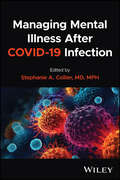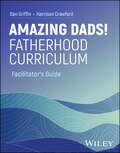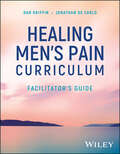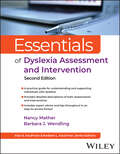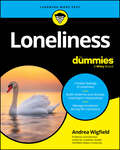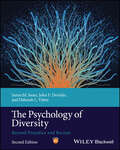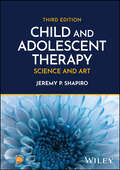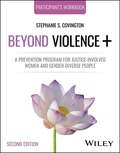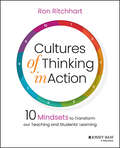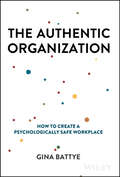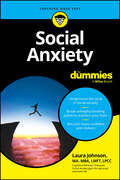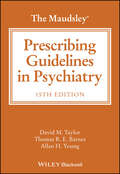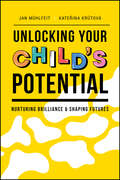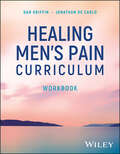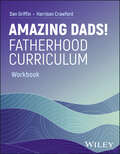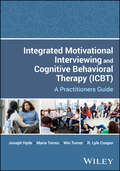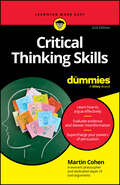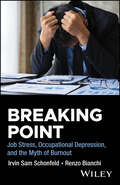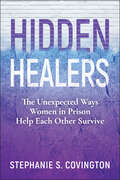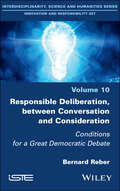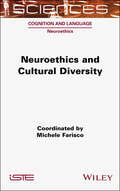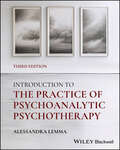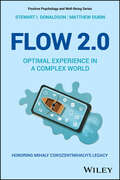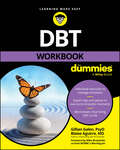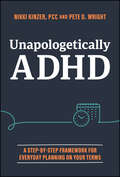- Table View
- List View
Managing Mental Illness After COVID-19 Infection
by Stephanie A. CollierA concise, practical guide to the mental health effects of COVID-19 and its treatments Managing Mental Illness After COVID-19 Infection is a resource for people affected by COVID-19 and their loved ones. As the long-term effects, especially the psychiatric effects, evolve and become more common, people are increasingly searching for answers. This book reviews presentations and treatments for mental illnesses post-COVID-19. Readers will learn about the use of medications, supplements, and behavioral interventions to address these conditions. This engaging and practical book includes numerous tables and other illustrations for easy reference. It provides enough medical detail for patients and their caregivers to better understand the symptoms they may experience, as well as the best ways to investigate and treat those symptoms. However, it is not too complex for the general reader, making it perfect as a standalone book for patients and their families. Learn how and why many people struggle with mental illness following COVID-19 infection Discover what your symptoms may indicate and get advice on how to pursue diagnosis and treatment Find a doctor who can understand and manage the mental and behavioral consequences of COVID-19 Get up to speed on the psychiatric and psychosocial effects of COVID-19 infection This is an excellent resource for the public, policymakers, clinicians, counselors, social workers, and behavioral health coaches that could benefit from the latest research on the psychiatric effects of COVID-19.
Amazing Dads! Fatherhood Curriculum, Facilitator's Guide
by Dan Griffin Harrison CrawfordThe only trauma-informed curriculum designed to turn men into great dads Amazing Dads Fatherhood Curriculum teaches fathers with kids of all ages to become exceptional parents. These detailed lessons meet dads where they are, starting from the common tendencies of male socialization to help explain key concepts of healthy fathering. Through a trauma-informed approach, this curriculum creates safety in the group setting while delving into critical topics that fathers simply do not tend to talk about with people in their lives. Unlike other fatherhood curricula, Amazing Dads addresses a breadth of topics, empowering men to discuss issues like family of origin, sexuality, how punishment can turn into abuse, self-care, and how toxic messages in the culture can hinder parent-child relationships. Each session incorporates grounding and breathing exercises, in addition to activities, exercises, and experiential opportunities that allow participants to connect with the material on a meaningful level. By the end of this course, fathers will have gained the increased self-awareness needed to enhance their relationships with their children and other family members. Lead fathers through a curriculum of targeted lessons focused on how male socialization affects their parenting Guide participants through exercises for developing relational, communication, and conflict resolution skills Connect with dads on a meaningful level by creating a safe space for discussions of trauma and other difficult subjects Explain important parenting concepts using examples, hands-on activities, and more This curriculum is excellent for use in parenting groups, behavioral health treatment programs, addiction treatment programs, and other community-based programs serving fathers. Dads of all backgrounds, with kids of all ages, will benefit from the wisdom in Amazing Dads Fatherhood Curriculum.
Healing Men's Pain Curriculum, Facilitator's Guide
by Dan Griffin Jonathan De CarloA 36-hour curriculum designed to help men overcome past trauma and develop the skills they need to live safe and caring lives Healing Men's Pain Curriculum helpsmale-identified participants create a vision of the men they want to be and provides them with the awareness, tools, and confidence to achieve that vision. Each of the 18 two-hour, cofacilitated sessions includes activities, exercises, and experiential opportunities enabling each participant to connect with the content on a personal level. The program is wide-ranging and encompasses a variety of topics to help participants develop increased self-awareness to enhance their relationships. Participants explore their childhood, adolescent, and adult trauma; relational struggles, particularly issues of healthy attachment; and other issues that male-identified individuals often experience. The material in Healing Men's Pain Curriculum will stretch both participants and facilitators alike. The sessions are designed to take a deep and comprehensive look at everything that blocks men from being the best men they can be. The curriculum speaks to all learning styles through the use of art, physical movement, and roleplays. Participants are given additional learning opportunities in the form of assignments to complete between sessions. These assignments build upon the roleplays and in-session practice to help participants translate the material directly into their own lives. Help men address their traumas, develop self-awareness, and build healthier relationships in recovery programs, mental health groups, or other settings Pick and choose from 18 intentionally designed lessons—or use the entire curriculum in order Access engaging activities that get participants moving and talking despite diverse learning styles and backgrounds Focus on male socialization, narrative therapy, and interactive learning to help participants develop understanding of themselves and others Written by an expert on masculinity with a Master's degree in gender studies, this curriculum is an excellent foundation or supplement to addiction programs, trauma groups, men's groups, church groups, and beyond. Designed as a compliment to Helping Men Recover.
Essentials of Dyslexia Assessment and Intervention (Essentials of Psychological Assessment #89)
by Nancy Mather Barbara J. WendlingExpert guidance on the features of dyslexia and the most effective treatment options Essentials of Dyslexia Assessment and Intervention allows psychologists, graduate students, reading specialists, and others to quickly acquire the knowledge and skills needed to treat individuals struggling with dyslexia. This book provides step-by-step guidance on accurately identifying, assessing, and using evidence-based interventions with individuals with dyslexia. Addressing the components that need to be considered in the assessment of dyslexia—both cognitive and academic—this book includes descriptions of the various tests used in a comprehensive dyslexia assessment along with detailed, evidence-based interventions that professionals and parents can use to help individuals struggling with dyslexia. A part of the trusted Essentials of Psychological Assessment series, this book features concise chapters designed to facilitate retention of key concepts with callout boxes, bullet points, and extensive illustrations. Additionally, the chapters contain questions to test your knowledge and reinforce what you have learned. This updated second edition covers essential topics for today’s professionals, including genetic factors, reading instruction, technology, and dyslexia in schools. Gain an understanding of the neurological and genetic causes and risk factors of dyslexia Assess reading fluency, phonological awareness, and other markers of dyslexia Discover the latest interventions for improving reading and spelling in individuals with dyslexia Learn to pick up on cues that help with early identification and treatment of dyslexiaProviding an in-depth look at dyslexia, this straightforward book presents information that will prepare school psychologists, neuropsychologists, educational diagnosticians, special education teachers, as well as general education teachers, to recognize, assess, and provide effective treatment programs for dyslexia. The book is also a good resource for parents who are helping a child with dyslexia.
Loneliness For Dummies
by Andrea WigfieldCombat the rising epidemic of loneliness with trustworthy information and advice Loneliness for Dummies helps readers understand loneliness and how to take steps to overcome this unwanted feeling. At some point in life, loneliness affects everyone. It can be triggered by unusual situations and events like children leaving home, losing a loved one, working remotely, moving, divorce, or retirement. It can also occur seemingly without reason. Thanks to this book, you don’t have to be afraid of being lonely. Loneliness For Dummies explains that loneliness is a natural reaction that signals us to make a change. You’ll learn the signs to look out for to assess loneliness, why people feel lonely, and most importantly, step-by-step actions you can take to reduce your feelings of loneliness. Read case studies of people who have felt lonely to see how they overcame loneliness. This book includes a simple scale to help you measure how lonely you feel, so you can identify which changes to make and assess your progress. Learn why people feel lonely, including the situations that trigger loneliness and what this uncomfortable feeling means Discover the signs of loneliness so you can recognize it in others and step in to help Complete a questionnaire to gauge your own loneliness and identify steps you can take to feel less lonely Make changes to your lifestyle that will lead to greater satisfaction in the long runThis is the perfect Dummies guide for anyone who is currently feeling adrift without social connections and wants to make a change. Organizations looking for a reference for students or outreach professionals will also appreciate Loneliness For Dummies.
The Psychology of Diversity: Beyond Prejudice and Racism
by James M. Jones Deborah L. Vietze John F. DovidioExamines the barriers and benefits of diversity, offering a comprehensive framework for addressing systemic inequities and enhancing intergroup relations The Psychology of Diversity: Beyond Prejudice and Racism provides a thorough exploration of how diversity influences individual and societal behavior. Now in its second edition, this fully revised textbook addresses the evolving challenges and opportunities of diversity in a world shaped by rapid demographic shifts, rising polarization, and the intensifying need for equity and inclusion. Integrating rigorous research, historical context, and actionable insights, the authors illuminate how understanding and embracing diversity can foster stronger communities and institutions. Updated and expanded content responds to the evolving challenges of the past decade, such as rising political polarization, increasing resistance to equity initiatives, and the escalating diversity divide, while highlighting new opportunities for inclusion and mutual understanding. Entirely new chapters address health disparities, racial bias in policing, debates over affirmative action and Critical Race Theory, the historical and systemic roots of diversity challenges, and other contemporary issues. Featuring timely coverage of diversity's complexities in the face of unprecedented societal changes, Psychology of Diversity: Beyond Prejudice and Racism: Explores diversity through psychological, historical, cultural, and institutional lenses while highlighting its broader societal impacts Provides evidence-based strategies and best practices for fostering inclusion, reducing bias, and building stronger intergroup relations Incorporates empirical research and case studies reflecting the latest findings in psychology, sociology, and neuroscience Contains new content on gender diversity, nonbinary identities, sexual orientation, and immigration as key diversity challenges and opportunities Integrates practical scenarios to illustrate key concepts and their application in everyday life Includes a wealth of teaching and learning tools and an online instructor's manual to support both independent study and classroom use The Psychology of Diversity: Beyond Prejudice and Racism, Second Edition, is an excellent textbook for advanced undergraduate and graduate courses on social psychology, prejudice, intergroup relations, and multiculturalism. It is also a valuable reference for professionals working to address equity challenges in fields such as education, healthcare, public policy, and organizational leadership.
Child and Adolescent Therapy: Science and Art
by Jeremy P. ShapiroThe most comprehensive textbook on the theory, research, and practice of child and adolescent therapy Child and Adolescent Therapy: Science and Art is a unique textbook that introduces readers to all the major theoretical orientations (CBT, family systems, etc.) and applies them to the common diagnostic categories (anxiety, disruptive behavior, etc.). Rather than championing one therapeutic approach above the others, it identifies the strengths and applicability of each, with an emphasis on matching strategies to client needs and preferences. The central theme is the integration of outcome research and clinical reasoning to choose techniques and personalize counseling for each client. The vast literature on therapy outcomes is distilled into user-friendly summaries with clear conclusions and implications for treatment planning. The book models the thought processes of expert clinicians as they integrate theoretical principles, research findings, and observations of clients in real time to conceptualize cases, make clinical decisions, and decide what to say next. Theoretical concepts, empirically supported treatments, and best practices are translated into numerous examples of therapist statements and conversations between counselor and client. Unlike edited books with chapters by different authors, this work is an integrated whole, with connections between chapters, a building block approach to learning, and unifying themes developed throughout the book. The Third Edition has been thoroughly updated to reflect current research and clinical advances. It features new material on: The Internal Family Systems therapeutic model Modular psychotherapies Transdiagnostic approaches Head-to-head comparisons between empirically supported therapies This textbook offers a thorough and practical introduction for graduate students in psychology, counseling, and social work. It also serves as a valuable resource for practicing mental health professionals who want to fill gaps in their knowledge, catch up with the outcome research, and learn new techniques. Purchasers get access to a companion website where they can download therapy handouts; instructors can also download teaching materials such as questions for discussion and exam questions.
Beyond Violence+: A Prevention Program for Justice-Involved Women and Gender-Diverse People, Participant's Workbook
by Stephanie S. CovingtonA gender-responsive, trauma-informed path forward for incarcerated women Beyond Violence: A Prevention Program for Criminal Justice-Involved Women is a comprehensive, evidence-based program specifically designed to meet the unique needs of women in correctional settings who have committed a violent crime. In 20 carefully designed sessions, it identifies personal factors correlated with violence, examines the importance of relationships, and explores how violence can manifest in various settings. This package includes both a step-by-step Facilitator Guide and a Participant Workbook. Beyond Violence encourages active participation, leading women to a deeper understanding of violence and of themselves. Author Stephanie Covington is nationally recognized for her expertise in creating, implementing, and facilitating women's treatment programs. In Beyond Violence, she offers counselors, mental health professionals, and program administrators the tools they need to implement this respected program within the criminal justice system. Participants will: Understand the relationships between thoughts, feelings, and behaviors—with a focus on anger and violence Learn new skills, including communication, conflict resolution, decision making, and calming soothing techniques Discover the effects of our families, our relationships, communities, and the larger society on our lives Become part of a group of women working to create a less violent world. The Facilitator's Guide contains the theory, structure, and content needed to run effective groups. The Participant's Workbook is designed so that women can process, record, and refer back to their therapeutic experience.
Cultures of Thinking in Action: 10 Mindsets to Transform our Teaching and Students' Learning
by Ron RitchhartFrom leading educational researcher Ron Ritchhart, a deep dive that illuminates what the foundational mindsets needed to create cultures of thinking really looks like in action. Building on the framework presented in the best-selling Creating Cultures of Thinking, Ron Ritchhart’s new book, Cultures of Thinking in Action, takes the next step in helping readers not only understand how a culture of thinking looks and feels, but also how to create it for themselves and their learners. Arguing that no set of practices or techniques alone is sufficient to create a culture of thinking in and of itself, Ritchhart explores the underlying beliefs that motivate the creation of cultures of thinking, presenting key mindsets every educator and leader needs to embrace if they are serious about creating powerful thinkers and learners. Much more than just an instructional guide, Cultures of Thinking in Action offers readers a reflective journey into their own teaching, leading, and parentingwhile providing the foundation and concrete strategies needed to create and develop a culture of thinking for all learners. This book: Presents ten foundational mindsets of a culture of thinking Includes the latest research of the Cultures of Thinking Project Includes questions, exercises, and discussion prompts to inspire reflection by individuals and teams Provides case studies and best practice scenarios to exemplify each mindset Provides useful data collection tools to inform one’s teaching practice
The Authentic Organization: How to Create a Psychologically Safe Workplace
by Gina Battye"The Authentic Organization is an empowering guide, offering an approachable framework for organizations to go beyond diversity and inclusion. It is an invaluable resource for any leader hoping to gain and maintain a competitive edge in today's talent market!" - Sergio Rodriguez, Senior Manager, Global Workforce DEI Solutions "The Authentic Organization deals with a hugely important topic – how to create Psychological Safety in the workplace. This book is insightful, practical, fun and easy to read!" -Andreas Richter, Professor of Organisational Behaviour, University of Cambridge “This is a timely book, written with heart. There is an increasing focus on Psychological Safety and Gina brings the concept to life, explaining how to make it a reality for everyone in our organisations.” -Simon Blake, Chief Executive Officer, Mental Health First Aid England Mastering Psychological Safety: Your definitive guide to cultivating a psychologically safe workplace In The Authentic Organization: How to Create a Psychologically Safe Workplace, CEO of the Psychological Safety Institute Gina Battye, delivers a hands-on manual to create work environments where people thrive. You’ll discover actionable strategies to establish a psychologically safe workplace; challenging and transforming workplace attitudes and outdated workplace cultures. Expect to experience a paradigm shift where psychological safety is at the core, enabling an inclusive culture and catalyzing organizational success. This book goes beyond the mechanics of creating a safe workplace, it also empowers individuals to unleash their authentic selves, not just surviving, but truly thriving, both professionally and personally. You’ll gain valuable insights and practical guidance to bring your authentic self to work, effectively navigate workplace interactions and create a highly conducive environment for teamwork and collaboration. Ultimately, you will have everything you need to drive cultural change and take an active role in creating a psychologically safe environment that empowers your team and transforms your entire organization. Gina masterfully navigates you through her distinctive approach, the world-renowned 5 Pillars of Psychological Safety framework, meticulously designed to cultivate an environment where your organization and people thrive. Within these pages you will encounter: A transformative process that empowers individuals to bring their Authentic Self to work, tapping into hidden capabilities to excel in their professional lives. A comprehensive communication framework that equips individuals to effortlessly master effective workplace interactions. A ground-breaking methodology that cultivates an environment where teams thrive and collaborate effectively in a calm and focused workplace setting. A must-read blueprint for anyone aiming to create psychologically safe work environments, The Authentic Organization is your comprehensive guide to cultivating a workplace where individuals and teams thrive. This book is the ultimate manual that leaders, managers, human resources professionals, Employee Resource Group leads, and business innovators have been waiting years for.
Social Anxiety For Dummies
by Laura JohnsonBreak free from social anxiety, one step at a time Feeling anxious around people? Not sure where to start? Then this user-friendly, practical resource might be exactly what you’re looking for. This workbook helps you tackle your fear of judgment and worry about what others think of you. You’ll find simple step-by-step instructions, worksheets and real-world examples to help you gain insight and control over your social anxiety. Social Anxiety For Dummies is a solution-focused guide to creating a new mindset about social anxiety and your ability to cope with it. This book has easy-to-understand information and effective strategies to help you make positive changes in your life. Packed with tips and tools to conquer your social anxiety Create positive self-talk, reduce avoidance and face your fears Discover how to deal with social situations, dating, public speaking, kids with social anxiety and workplace anxiety Explore how positive psychology can help you live a life of meaning, with or without social anxiety A complete guide with proven ideas, this is a jargon-free and a fun approach to gaining mastery over your social anxiety. Social Anxiety For Dummies puts you on the fast track to building your self-esteem and confidence.
The Maudsley Prescribing Guidelines in Psychiatry (The Maudsley Prescribing Guidelines Series)
by Allan H. Young David M. Taylor Thomas R. BarnesThe most up-to-date edition of the gold-standard handbook on the safe and effective prescribing of psychotropic agents Prescribing medications that treat mental illness is a challenging but essential component of clinical practice. Successful treatment outcomes require careful drug choice and dosage, and other considerations can also have an important impact on patient experiences and long-term care. In the newly revised fifteenth edition of The Maudsley Prescribing Guidelines in Psychiatry, you will find up-to-date and authoritative guidance on prescribing psychotropic medications to patients. It is an indispensable evidence-based handbook that will continue to serve a new generation of clinicians and trainees. The book includes analyses of all psychotropic drugs currently used in the United States, the United Kingdom, Canada, Australia, New Zealand, and Japan. It also contains detailed discussions of common and uncommon adverse effects, the ramifications of switching medications, special patient groups, and other clinically relevant subjects. A fully updated reference list closes out each section, as well. The Maudsley Prescribing Guidelines in Psychiatry is perfect for trainees seeking essential and accurate information on the rational, safe, and effective use of medications for patients with mental illness. Practising clinicians will also benefit from the included guidance on complex issues that might arise less frequently.
Unlocking Your Child's Potential: Nurturing Brilliance & Shaping Futures
by Jan Muhlfeit Katerina KrutovaDevelop your child's talents, energy, inspiration, and motivation In Unlocking Your Child's Potential: Nurturing Brilliance and Shaping Futures, authors Jan Mühlfeit, a leader, global strategist and coach, and Kateřina Krůtová, an experienced lecturer in the field of education and child development, deliver a startlingly insightful and exciting discussion of how to bring out the best in your children. In the book, you'll learn how to avoid the four most common and basic mistakes made by parents and teachers—including focusing on weaknesses while forgetting strengths, neglecting why children do what they do, controlling time instead of harnessing energy, and focusing on success instead of happiness—and learn to achieve something for yourself and your children. You'll gain valuable and actionable knowledge you can apply immediately in areas like: Positive psychology and how children's brains actually function How to search for a child's true self, their authenticity, and their exceptional character Strategies for encouraging and harnessing energy, motivation, and inspiration in young children Perfect for parents, teachers and coaches everywhere, Unlocking Your Child's Potential is also a must-read resource for early childhood educators, social workers who work with young children, and anyone else interested in bettering the lives of the youngest among us.
Healing Men's Pain Curriculum, Workbook
by Dan Griffin Jonathan De CarloA 36-hour curriculum designed to help men overcome past trauma and develop the skills they need to live safe and caring lives Healing Men's Pain Curriculum helps male-identified participants create a vision of the men they want to be and provides them with the awareness, tools, and confidence to achieve that vision. Each of the 18 two-hour, cofacilitated sessions includes activities, exercises, and experiential opportunities enabling each participant to connect with the content on a personal level. The program is wide-ranging and encompasses a variety of topics to help participants develop increased self-awareness to enhance their relationships. Participants explore their childhood, adolescent, and adult trauma; relational struggles, particularly issues of healthy attachment; and other issues that male-identified individuals often experience.The material in Healing Men’s Pain Curriculum will stretch both participants and facilitators alike. The sessions are designed to take a deep and comprehensive look at everything that blocks men from being the best men they can be. The curriculum speaks to all learning styles through the use of art, physical movement, and roleplays.Participants are given additional learning opportunities in the form of assignments to complete between sessions.These assignments build upon the roleplays and in-session practice to help participants translate the material directly into their own lives. Help men address their traumas, develop self-awareness, and build healthier relationships in recovery programs, mental health groups, or other settings Pick and choose from 18 intentionally designed lessons- or use the entire curriculum in order Access engaging activities that get participants moving and talking despite diverse learning styles and backgrounds Focus on male socialization, narrative therapy, and interactive learning to help participants develop understanding of themselves and others Written by an expert on masculinity with a Master's degree in gender studies, this curriculum is an excellent foundation or supplement to addiction programs, trauma groups, men’s groups, church groups, and beyond. Designed as a compliment to Helping Men Recover.
Amazing Dads! Fatherhood Curriculum, Workbook
by Dan Griffin Harrison CrawfordThe only trauma-informed curriculum designed to turn men into great dads Amazing Dads Fatherhood Curriculum teaches fathers with kids of all ages to become exceptional parents. These detailed lessons meet dads where they are, starting from the common tendencies of male socialization to help explain key concepts of healthy fathering. Through a trauma-informed approach, this curriculumcreates safety in the group setting while delving into critical topics that fathers simply do not tend to talk about with people in their lives. Unlike other fatherhood curricula, Amazing Dads addresses a breadth of topics, empowering men to discuss issues like family of origin, sexuality, how punishment can turn into abuse, self-care, and how toxic messages in the culture can hinder parent-child relationships. Each session incorporates grounding and breathing exercises, in addition to activities, exercises, and experiential opportunities that allow participants to connect with the material on a meaningful level. By the end of this course, fathers will have gained the increased self-awareness needed to enhance their relationships with their children and other family members. Lead fathers through a curriculum of targeted lessons focused on how male socialization affects their parenting Guide participants through exercises for developing relational, communication, and conflict resolution skills Connect with dads on a meaningful level by creating a safe space for discussions of trauma and other difficult subjects Explain important parenting concepts using examples, hands-on activities, and more This curriculum is excellent for use in parenting groups, behavioral health treatment programs, addiction treatment programs, and other community-based programs serving fathers. Dads of all backgrounds, with kids of all ages, will benefit from the wisdom in Amazing Dads Fatherhood Curriculum.
Integrated Motivational Interviewing and Cognitive Behavioral Therapy (ICBT): A Practitioners Guide
by Maria Torres Win Turner Joseph Hyde R. Lyle CooperA practical approach to clinical interventions applicable to a range of mental health diagnoses Integrated Motivational Interviewing and Cognitive Behavioral Therapy (ICBT) for Adults is a guide for practitioners looking for evidence-based clinical interventions that are portable across settings and diagnoses. Written in plain English and with an emphasis on step-by-step instructions, this valuable toolkit collects strategies and interventions that have been shown to be effective in substance use disorder, depression, anxiety, and beyond. This widely applicable treatment approach draws on motivational interviewing, cognitive behavioral therapy (CBT), motivational enhancement therapy, mindfulness, functional analysis, and other methods that are strongly supported in the literature. With content reflecting emerging research findings and evolving social contexts, this book is both timely and firmly rooted in science. After presenting a set of proven techniques for motivational interviewing and CBT, this book details a 16-session course designed to fit within conventional models of therapeutic practice. Each session covers a cognitive behavioral skill (e.g., assertiveness, handling cravings, suicidality) and builds upon the previous sessions, but they also work as standalone interventions and do not have to be followed in a particular order. The book also offers additional tools to promote intervention quality and clinical supervision. Worksheets, handouts, and other materials are included in photocopiable format, making this a valuable guide in all outpatient mental health settings. Learn the fundamentals of motivational interviewing, cognitive behavioral therapy, and other evidence-based treatment modalities Get practical clinical tools, including step-by-step session guides on cognitive behavioral skills relevant to a range of diagnoses Access self-assessments, clinical supervision tools, and other resources to enhance clinical effectiveness Incorporate emerging research, changing social contexts, and lessons learned from the COVID-19 pandemic into your practice Earlier editions of this guide focused on addressing substance use disorders and cooccurring disorders. This edition is applicable to those disorders but reflects that these clinical strategies are transdiagnostic.
Critical Thinking Skills For Dummies
by Martin CohenLearn how to argue points effectively, analyze information, and make sound judgments The ability to think clearly and critically is a lifelong benefit that you can apply in any situation that calls for reflection, analysis, and planning. Being able to think systematically and solve problems is also a great career asset. Critical Thinking Skills For Dummies helps you hone your thinking abilities and become a better communicator. You’ll find hands-on, active instruction and exercises that you can put to work today as you navigate social media and news websites, chat with AI, fact-check your own and others’ views, and more. Become a thinking machine, with this Dummies guide. Identify other people’s arguments and conclusions—and spot holes in them Evaluate evidence and produce more effective arguments in any situation Read between the lines of what people say and form your own judgments Apply critical thinking to school or college assignments to improve your academic performance This is the perfect Dummies title for students, researchers, and everyone who seeks to improve their reasoning and analysis ability.
Breaking Point: Job Stress, Occupational Depression, and the Myth of Burnout
by Irvin Sam Schonfeld Renzo BianchiBurnout has become a popular indicator of the distress that individuals can experience at work. In Breaking Point: Job Stress, Occupational Depression, and the Myth of Burnout, the authors, in the context of more than a decade of research, show how the phenomenon hidden behind the label of burnout is, in fact, depressive in nature. This book unravels the connections between work, depression, and burnout. The authors underline the dangers of mislabeling a depressive condition as burnout, including misdiagnosis, improper treatment, and unaddressed suicidality. Finally, they offer a path forward for individuals and society. By recognizing the depressive roots of burnout, human resources specialists and occupational health professionals can refer employees for appropriate treatment and understand how and why problematic working conditions must be changed. Review the history of depression and burnout and their connection to work Learn about research that supports occupational depression as a more valuable construct than burnout Understand and address the stigma that inhibits affected employees from seeking treatment Discover specific, research-grounded actions that occupational health specialists can take to prevent and address depression and burnout in the workplace
Hidden Healers: The Unexpected Ways Women in Prison Help Each Other Survive
by Stephanie S. CovingtonA gripping and deeply-felt examination of incarcerated women's lives With unflinching clarity, Hidden Healers cuts through the myths about incarcerated women to expose the all-too-real brutalities they face within a criminal legal system never designed for them. Backed by three decades' experience providing therapeutic programs inside prisons across the United States, trauma specialist Dr. Stephanie Covington has used her unique access to amplify the voices of the women themselves. Their stories illuminate realities most never see: that most women who get caught up in the criminal justice system have themselves been victims of harm, that the degradations of today's prisons and jails only magnify their trauma- and that incarcerated women regularly risk punishment to tend to one another's well-being in unexpected acts of kindness. Grounded in research and rich with personal narrative, Hidden Healers is a poignant and riveting look inside women's prisons and jails- and what we can do to help.
Responsible Deliberation, between Conversation and Consideration: Conditions for a Great Democratic Debate
by Bernard ReberCommunication is a crucial issue in our complex societies tinted by distrust. It is the core of democratic life and almost all human and social actions. Therefore it is essential for communication to be responsible. But responsible communication cannot only be conceived as a deontological issue, framed by ethical compliance requirements or good practices promotion. It should be considered with all the virtualities of communication, from conversation to consideration, going through narrative, interpretation and argumentation. Indeed each of these communicational capacities has its properties, assets, complementarities and limitations. They constitute different ways to be responsive. This book offers a contribution to the debate of Theory of Deliberative Theory (TDD), reexamined here within its different inspiration sources, notably the opposition between communicational turn and system, the fact of moral pluralism and the public reason.
Neuroethics and Cultural Diversity
by Michele FariscoThere is a growing discussion concerning the relationship between neuroethical reflections and cultural diversity, which is among the most impactful factors in shaping neuroethics, both as a scientific discipline and a social enterprise. The impacts of culture on science and its public perception are particularly relevant to neuroethics, which aims to facilitate the creation of an interface between neuroscience and society at large. Time is ripe for neuroethics to review the influence of the culturally specific contexts from which it originated (i.e. North America and Western Europe) and to also include other cultural perspectives in the discussion. This book illustrates a convergent approach among different cultures in identifying the main issues raised by neuroscience and emerging technologies. This should be taken as a starting point for advancing in the search for shared solutions, which are, if not definitive, at least sufficiently reliable to be translated into democratic deliberative processes.
Introduction to the Practice of Psychoanalytic Psychotherapy
by Alessandra LemmaAn essential guide to psychoanalytic psychotherapy in modern practice. A must-have for those new to the field and seasoned professionals alike Introduction to the Practice of Psychoanalytic Psychotherapy provides up-to-date, practice-oriented coverage of the latest research and techniques in psychoanalysis. Distinguished clinical psychologist and psychoanalyst Alessandra Lemma synthesizes decades of clinical experience and the latest research into actionable advice for developing analytic skills with clarity, confidence, and adaptability across diverse therapeutic settings. This popular textbook offers step-by-step guidance on essential areas of practice, including conducting assessments, formulating cases, and navigating therapeutic endings. Throughout the book, detailed yet accessible chapters demystify the processes behind psychoanalytic psychotherapy while offering real-world insights into the day-to-day practice of psychoanalytic therapy. Fully revised to reflect contemporary practice, this edition features three entirely new chapters on psychoanalytic ethics, working with the body, and online therapy. Updated and expanded chapters address new developments in Dynamic Interpersonal Therapy (DIT), discuss the current evidence base for psychoanalytic interventions, present new case studies and illustrative examples, and more. “Very few psychoanalysts are capable of what Alessandra Lemma achieves with this book: a deep understanding of the life of the mind coupled with a comfortable familiarity with the science of the mind.” —MARK SOLMS, Ph.D., Editor, The Revised Standard Edition of the Complete Psychological Works of Sigmund Freud (2024). “A third edition of this classic text is testimony to how well the original edition was written. Yet it also demonstrates that psychoanalytic therapy and the contexts in which it is practiced are in continual flux. To explain these changes and offer new updates there is no better guide than Alessandra Lemma. She has been at the forefront of many developments and has endeavoured to make psychoanalytic ideas and techniques relevant for the decade that lies ahead. This is a highly readable, enjoyable, and insightful book that deserves to be read again and again. There is always something fresh to discover.” — DR. ALISTAIR ROSS, Associate Professor in Psychotherapy, Kellogg College, Author of Introducing Contemporary Psychodynamic Counselling and Psychotherapy “There are many things to cherish about Alessandra Lemma’s Introduction to the Practice of Psychoanalytic Psychotherapy. Now appearing in its third edition, Lemma exemplifies a mentality that psychoanalysis is alive and kicking—and evolving. The book is especially candid in acknowledging how psychoanalysis, which began ahead of the social curve, but then began to lag behind, is now making up for lost time. It is a pleasure to encounter readings of Freud that are neither adulating nor deprecating, and it is even more of a pleasure to consider this version of contemporary psychoanalysis. Lemma’s work on integrating the body in psychoanalytic theory is well-known and is now incorporated into this book. In addition, Lemma addresses profound ethical issues that we have faced during the pandemic and in its aftermath. Clinicians at every stage of their careers will benefit from reading and reflecting on this terrific book.” — ELLIOT L. JURIST, Ph.D., Ph.D., Professor, Psychology and Philosophy, The City College of New York and Doctoral Faculty in Psychology and in Philosophy, The Graduate Center, The City University of NY
Flow 2.0: Optimal Experience in a Complex World. Honoring Mihaly Csikszentmihalyi's Legacy (Positive Psychology and Well-Being)
by Stewart I. Donaldson Matthew DubinHow the pioneering co-founder of the field of positive psychology can help us navigate our increasingly complicated world Over the years since Mihaly Csikszentmihalyi first published Flow: The Psychology of Optimal Experience, the field of positive psychology has become a rigorous, evidence-based discipline. Dr. Csikszentmihalyi’s pioneering work on “flow,” a state in which one is completely absorbed in a task or activity, continues to make lasting, positive impacts on individuals, groups, organizations, and societies around the world. In Flow 2.0, authors Stewart I. Donaldson and Matthew Dubin show us how their colleague’s and mentor’s contributions can be extended to improve our lives in 2024 and beyond. With an accessible and engaging narrative, the authors share what they have learned about flow over two decades of empirical research and provide a new framework designed to help us be fully engaged in our lives and flourish in complex and dynamic environments. Seven concise chapters explore ways the world has changed since the concept of flow was first developed, introduce the basics of flow and optimal experience, examine how we in our complex social and work lives, identify the essential role of flow in the PERMA+4 framework for work-related well-being and performance, and more. Addressing modern life contexts such as the hybrid world of work and the increasingly digital future of society, Flow 2.0: Optimal Experience in a Complex World is a must-read for all those seeking to improve their own lives and the lives of those around them.
DBT Workbook For Dummies
by Blaise Aguirre Gillian GalenAn effective skills-building resource for achieving real change with dialectical behavior therapy Dialectical behavior therapy (DBT) is the type of talk therapy with the most evidence-base for people who experience painful swings in emotions and volatile relationships. It is most commonly applied in the treatment borderline personality disorder who also experience suicidal thinking and behaviors and in recent years, therapists use it for other mental health conditions as well. With DBT, you can learn to regulate your emotions, tolerate distressing situations, improve your relationships, and apply mindfulness in your daily life. DBT Workbook For Dummies puts healing in your hands, giving you step-by-step exercises for learning these concepts and putting them to work. Great for patients, family members, and clinicians, this book is an essential resource for understanding emotions and behavior and then learning how to handle uncertainty when emotions and relationships are in flux. These clear and practical explanations and activities make it easy to move toward a new you. Learn the basic concepts of dialectical behavior therapy and apply them in your life Become more resilient by using coping skills that will help you achieve your goals Work through hands-on exercises that will help you navigate relationships, increase self-awareness, and overcome the impact of strong and painful emotions Manage mental health issues arising from intense emotions, poor self-esteem, and stressful situations Great on its own or paired with DBT For Dummies, this book will help patients, their family members, and DBT therapists in the search for concrete actions that promote thriving in the long term.
Unapologetically ADHD: A Step-by-Step Framework For Everyday Planning On Your Terms
by Nikki Kinzer Pete D. WrightStep-by-step yet flexible blueprint to plan long term goals, projects, and tasks when living with ADHD Written by Nikki Kinzer and Pete D. Wright, co-hosts of the hit podcast Taking Control: The ADHD Podcast with more than one million annual downloads, Unapologetically ADHD helps readers plan for long term goals, projects, and tasks that need to get done, providing a step-by-step outline for success that still allows for plenty of individual flexibility. An accessible and also fun read, this book is intentionally organized into clear sections within chapters and includes engaging visuals throughout. Readers get access to various coaching strategies, such as powerful questions and exercises, to help them move towards planning success on their own terms. In this book, you'll find information on: Understanding how the ADHD mind works and how to manage “all or nothing” mode Letting go of the shame that so many with ADHD feel and the concept of RSD (rejection sensitive dysphoria) acceptance Using practical tips that can be applied immediately to help you feel more in control of your life With a perfect balance between planning strategies and real conversations on what it's like to have ADHD, Unapologetically ADHD earns a well-deserved spot on the bookshelves of everyone with ADHD who wants to master an often-challenging executive function to live a more structured and fulfilling life.
